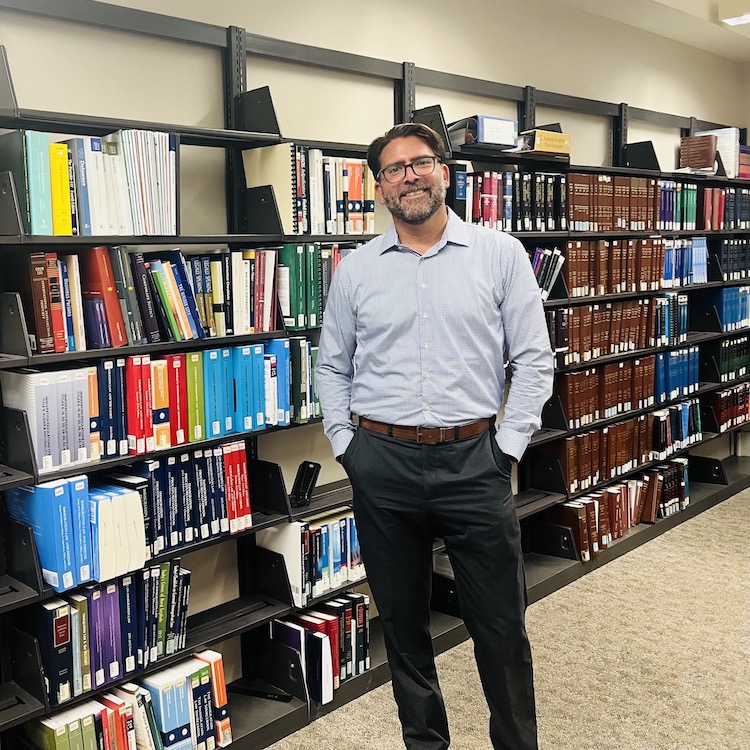This story is part of a series highlighting each of the MSU Law clinics – which have won life-changing cases for clients and have given students incredible starts to successful legal careers.
When Bradley Hall opens the doors to MSU College of Law’s new Public Defender Clinic this academic year, he will begin training the next generation of lawyers in a highly specialized area of law: preconviction appeals.
In doing so, he hopes to inspire future lawyers to take their expertise to all corners of Michigan, including urban and rural areas, helping to bolster the capabilities of local public defenders.
“Clinic students will work hand in hand with trial attorneys and travel to meet with clients all over the state,” said Hall, who will serve as interim director of the clinic. “They will file appellate briefs and present oral arguments. They’ll get a real sense of what this work is like.
“At the same time, they’ll be visiting great new public defender offices in some of the most beautiful parts of the state where they may choose to start their careers,” he said.
The Public Defender Clinic at Michigan State University College of Law is the first of its kind in Michigan and has the potential to help shape public defense law in the state, said Chief Justice Elizabeth Clement of the Michigan Supreme Court.
“MSU College of Law is positioned to become an incubator of great new public defenders and indigent defense innovation,” said Chief Justice Clement. “The result will be an even more dynamic and accessible indigent defense system that protects the rights of everyone in Michigan.”
Interim Dean Michael Sant’Ambrogio said MSU Law recognized the attorney shortage problem and wanted to be part of the solution.
“We’re helping fill the immediate need for quality preconviction appellate representation while offering MSU Law students a criminal law clinic,” he said. “They will also have the chance to learn about the vitally important and rewarding work of public defenders.”
The shortage of lawyers trained in the intricacies of preconviction appeals has strained statewide trial-level indigent defense systems that are responsible for appeals under the Michigan Indigent Defense Commission Act, Hall explained.
Public defenders in Michigan said they are looking forward to partnering with Hall and his students.
“The MSU clinic presents a great opportunity to engage the next generation of lawyers on complicated legal issues in our community while allowing our defenders to help mentor students’ talents and hard work,” said Patrick Crowley, Marquette County chief public defender. “It will be great for indigent defense statewide. And we look forward to working together.”
Robin Dillard-Russaw, director of Wayne County Indigent Defense Services called the MSU Public Defender Clinic “a winning formula.”
“In Detroit and elsewhere, there is a growing need for quality public defenders and private indigent defense counsel,” Dillard-Russaw said. “While we’ve done excellent work, the Public Defender Clinic will help fill additional needs while supporting local systems handle increasing numbers of complex interlocutory appeals.
“This promises to be a winning formula, and we are excited to work with the new clinic on continuing to improve indigent defense services in Wayne County and throughout Michigan,” Dillard-Russaw said.
For the past 10 years, Hall has been the administrator of the Michigan Appellate Assigned Counsel System, where he oversaw the appointment of counsel for about 3,000 indigent criminal appeals per year. He is one of the state’s foremost experts on criminal appeals.
He said pursuing appeals prior to conviction is important for several reasons. When warranted, preconviction appeals can clarify important and consequential questions of law and change the direction of a criminal case. They can also help hold police, prosecutors and judges accountable.
The most common successful preconviction appeals seek to suppress illegally obtained evidence, such as statements made by defendants not read their Miranda rights, or physical evidence discovered during warrantless searches. Preconviction appeals can also test the reliability of evidence or the appropriate reach of criminal statutes, among other issues.
Students will begin handling cases from various parts of the state in January 2025. At full capacity, the clinic is expected to handle a caseload of up to 20 preconviction appeals per year in partnership with local indigent defense systems. The Public Defender Clinic is the eighth law clinic in the MSU Law clinical program.
“We are excited to give MSU law students even more opportunities for hands-on educational opportunities. Law clinics are the gold standard of legal education,” said Kate Fort, director of Clinics at the MSU College of Law.
“We’ll be litigating cutting-edge constitutional issues for clients whose freedom hangs in the balance,” Hall said. “What an amazing experience for law students.”
